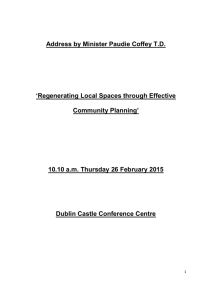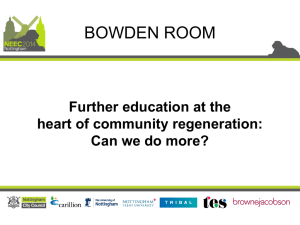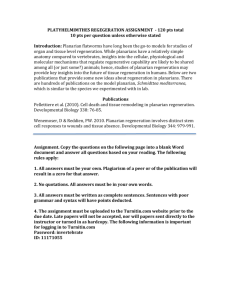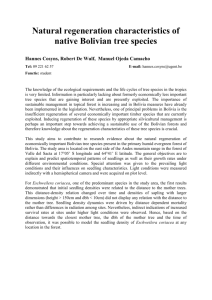Open - The Scottish Government
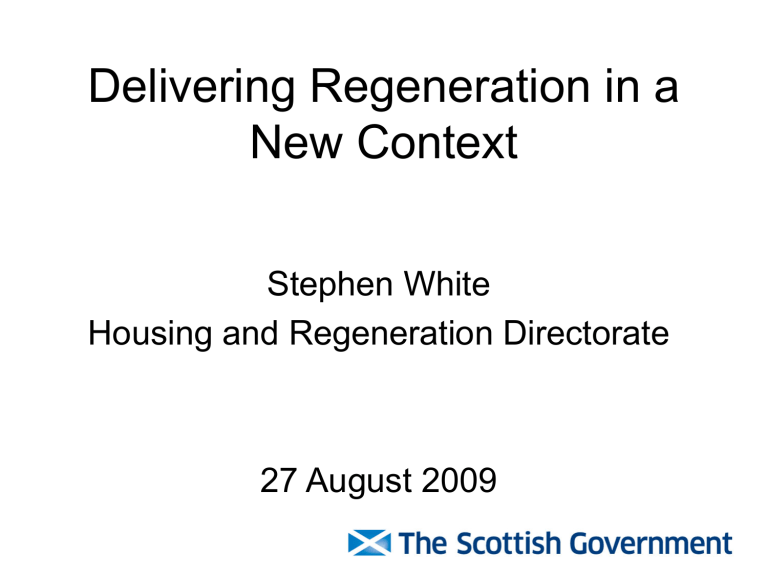
Delivering Regeneration in a
New Context
Stephen White
Housing and Regeneration Directorate
27 August 2009
Delivering Regeneration in a New Context
What has changed?
• Policy
– FSF – Roll up with LG settlement 2010-11
– Concordat & SOAs
• Economy
– Availability of Credit
– Impact on Households and Communities
• Practice
– A challenge to the mainstream
Delivering Regeneration in a New Context
What’s not changed?
Communities continue to experience :
• High unemployment and low economic activity levels
• High Crime
• Poor Health
• Low educational attainment
• Physical decay and poor environment
Delivering Regeneration in a New Context
National Outcome SIMD Evidence
We realise our full economic potential with more and better employment opportunities for our people
30% of people in the 15% most deprived areas are employment deprived. 10% across Scotland.
Our young people are successful learners, confident individuals, effective contributors and responsible citizens
The difference in S4 attainment between the 15% most deprived areas and Scotland is equivalent to two Standard Grades at award 3.
We live longer, healthier lives In 2006, healthy life expectancy at birth was 67.9 for men and 69 for women. In the most deprived
15% of areas, healthy life expectancy at birth was
57.3 years for men and 59 years for women.
We have tackled the significant inequalities in
Scottish society
34% of people in the 15% most deprived areas in
Scotland are living in poverty, compared to 16% in the rest of the country.
We live our lives safe from crime, disorder and danger
In 15% most deprived areas crime rates are more than 4 times higher than the rest of Scotland (one crime per six people vs one crime per 26 people).
Delivering Regeneration in a New Context:
Policy
• Beyond the FSF: Tackling High Levels of
Multiple Deprivation in Communities
– The FSF Approach – a transition to mainstreaming
– Working with COSLA – Clarifying Policy
– Anticipating SIMD 09– October
– Influencing Policy – Commissioned research on the
FSF Experience
Delivering Regeneration in a New Context: A
Policy Statement
• A governmental commitment to tackling inequalities between communities
• The role of SOAs and CPPs
• Achieving outcomes by means of area programmes, better targeted services - or both
• Continuing relevance of FSF principles
• Linked to other social policies and frameworks
Delivering Regeneration in a New Context:
Policy Principles
• Focus on root causes of established, concentrated multiple deprivation - not only symptoms;
• Emphasis on early intervention in potentially vulnerable communities;
• Promotion of joint working between community planning partners. Include links to the third and private sectors;
• Improving employability as a key means of extending opportunity and tackling high levels of local deprivation;
• Enabling resilience and empowering local communities to influence decision making.
Delivering Regeneration in a New Context:
Place Making and Economic Downturn
• Regeneration is still about realising the potential of place for the benefit of people and vice versa
• Linking opportunity with need
• Housing and Regeneration/ Renewal levers are different
• Government enables/ localities empowered
• Co-ordination of place making and people based approaches to community regeneration crucial
Delivering Regeneration in a New Context:
Housing and Regeneration Resources
2008-11
• Fairer Scotland Fund
• Urban Regeneration Companies
• Vacant and Derelict Land
• RSL Wider Role
• Town Centre Regeneration
• c. £650m
• Add housing - > £2bn
Delivering Regeneration in a New Context
The Housing Policy Dimension
• A housing system that does not meet
Scotland’s needs
• Not enough affordable homes – increase supply
• Not at the expense of standards
• Success with education, health etc linked with housing system
• Mixed tenure and mixed communities
• Recession effects
• Housing Supply Task Force – Access to finance; infrastructure provision, planning and land availability
Delivering Regeneration in a New Context:
Post FSF - Shift in Emphasis
• Policy and Leadership
– policy ambition and performance frameworks not a national ring fenced programme
• Resources
– Seven programmes to FSF… to LG Settlement and all CP partners budgets (and DWP?)
• Advice and assistance
‘Closed shop’ interchange groups to Learning Networks
• Measurement of success – SOAs not input/ output with national scrutiny
Delivering Regeneration in a New Context:
Success Factors
• Political Leadership
• Partnership working – all sectors
• Mainstream engagement – investment and services
• Building on economic opportunity/ understanding of social need
• Investing in education and skills
• Community involvement
• Quality sustainable design
• Ambitious but realistic outcome targets and timescales
Delivering Regeneration in a
New Context
Stephen White
Housing and Regeneration Directorate
27 August 2009


